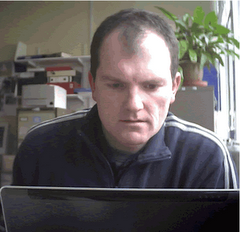- The human causes, based in greed and callous negligence are well documented. Last night I was talking to someone who was very close to the disaster, part of the actual community. They said with a heavy heart that the most moving programme of all the recent coverage for them was the one about the causes of the disaster... When will 'we' own our God given responsibilities/duties to carry on life on earth with the princely dignity, equity and righteousness we have been invested with? Your conscience screams at you 'do not do it' - so, do not do it. If you ignore your conscience for long enough you simply harden your heart and confound your moral compass, making you unfit to discern right from wrong, still less act on that.
- God, by any meaningful definition of that word, has a perfect right to run the universe as he sees fit and that might mean picking up the pieces after suffering and death have done their worst. You might have a problem with that? Take it up with him while you still can. Meet your Judge on the way, not at the trial. Rather that than take it as a pretext for denying his existence. Ah but that would involve humbling yourself... and there's the real rub...
- When you 'blame' God, you follow a long line of infamy all the way back to the first sin, amply demonstrating your infernal nature. Man was created to be 'like God', in love and holiness, yet in falling from these attributes, he blamed Eve, and Eve blamed the serpent. Nothing new or daringly clever about blaming God then. It's just the same old slander.
- Any conception of 'suffering' must invoke the point that an extremely horrific amount of suffering leading to an abject death was endured by Christ in crucifixion and yet this achieved the overwhelming benefit of salvation. Tremendous suffering entails overwhelming blessedness. Which chimes in with the text mentioned below in an extended quote from Iain Murray's 1990 biography (p570-572)...
As usual, there were many visits to Wales in 1967. One of these engagements he was to describe as the most extraordinary service he had been in. This was in Aberfan, a place suddenly known across the
P571
world on account of the terrible disaster which occurred there on October 2.1, 1966. The register had just been marked that morning in the village school when, at 9.05 a.m., a great heap of coal slurry which over-shadowed the building suddenly slipped and, with a rumble like thunder, engulfed nearly a whole generation of the local children. One hundred and sixteen died, along with twenty-eight adults. The coal.
mining areas of South Wales knew something of disasters but a tragedy of this nature, above ground, took the community into an abyss of sorrow from which it seemed it would never recover.
Dr Lloyd-Jones was asked to preach on the first anniversary of this disaster, November I 5, 1967 in the Welsh Presbyterian church, Capel Aberfan. All denominations, however, gathered for these services on the afternoon and evening of that day. In the evening the Welsh Baptist chapel, Smyrna, across the road was also packed for worship and to hear a relay of the sermon. The evening message was one of glorious comfort for believers from the words of Romans 8: 18—23, ‘For I reckon that the sufferings of this present time are not worthy to be compared with the glory which shall be revealed in us . . .'. At the conclusion of a profoundly moving service, the Rev Wilfred Jones, the Vicar of Aberfan came forward to tell the preacher that this was the message for which Aberfan had been waiting. Two years later a woman wrote a postcard to say she would never forget those services at Aberfan and many others confessed the same. ‘I have heard the eminent preachers of all the Churches,‘ said one Anglican hearer, ‘but have never heard a sermon or address to compare with what I heard at Aberfan.’ A letter written to ML-J by one of the ministers present, the Rev John Phillips of Merthyr Tydfil, on November 19, 1967, gives a vivid impression of the effect which this preaching had upon the community: Your visit was eagerly awaited at Aberfan and had been the subject of all our prayers over the past weeks. Once again our prayers have been answered, praise His Name, for I know that, through your messages, inspired by Him, we have all received, not only a wonderful blessing, but renewed courage and determination. After the services I saw mothers, who had lost little ones, and fathers also, smile with renewed hope in their faces. I know they will face the future now with more confidence. God bless you, for all you have done for these dear people here and indeed for us all.
The whole series of services, culminating in your visit, has sparked a flame amongst the churches in Aberfan. Since the disaster everything has
P573
been so utterly dormant that it is wonderful to see a re-awakening. After our experiences of the past week there is more of a spirit of unity, and care for the church and the work of Christ, than has existed for many a
long year. I am determined that I shall devote my life and my energies to see that the flame which has been kindled shall not die, but shall grow and spread for His everlasting glory.'

No comments:
Post a Comment